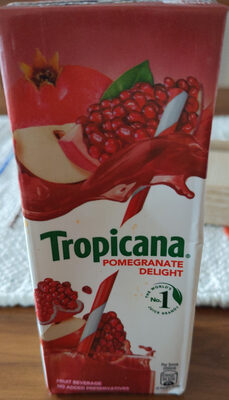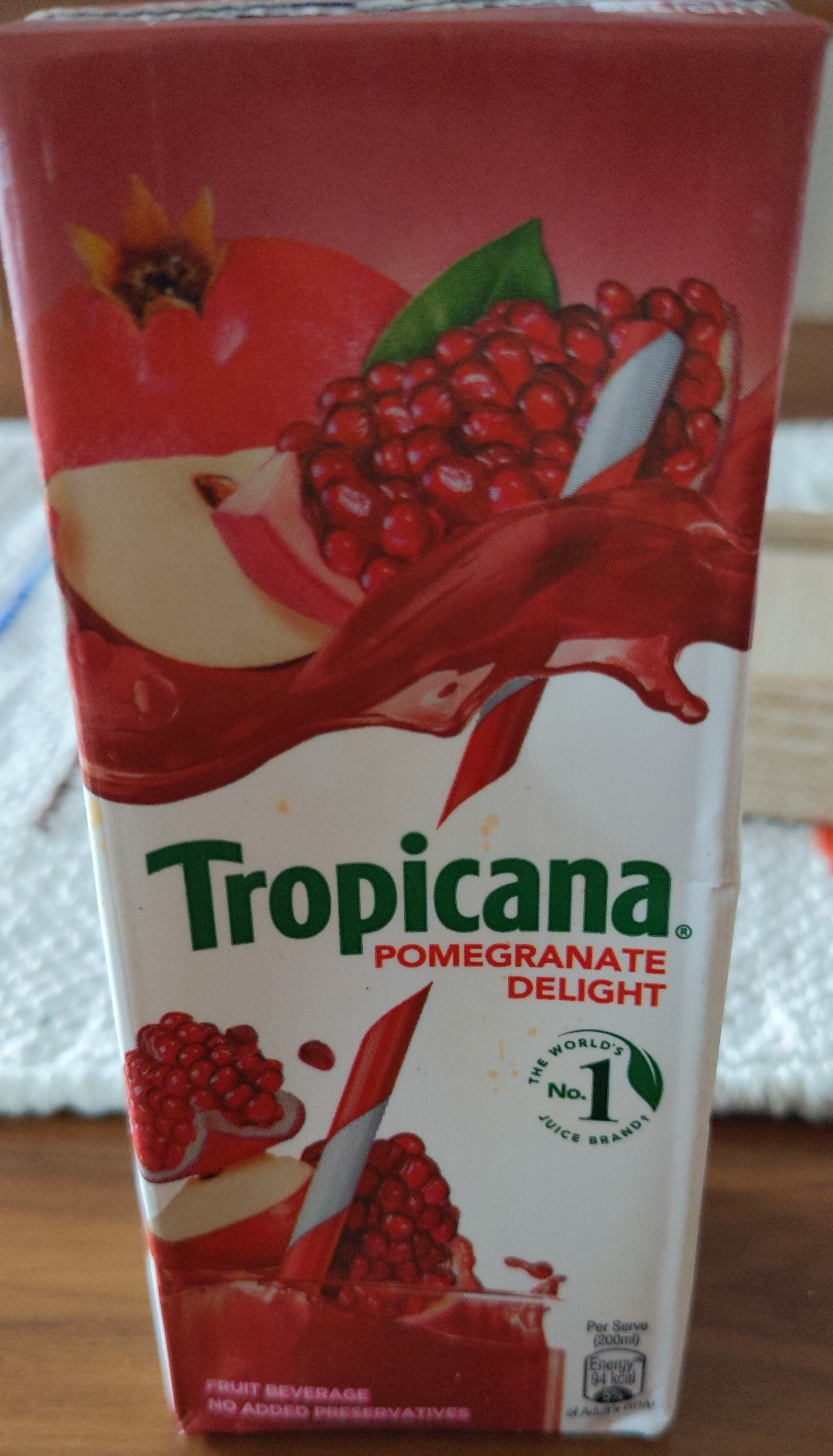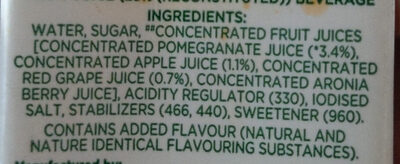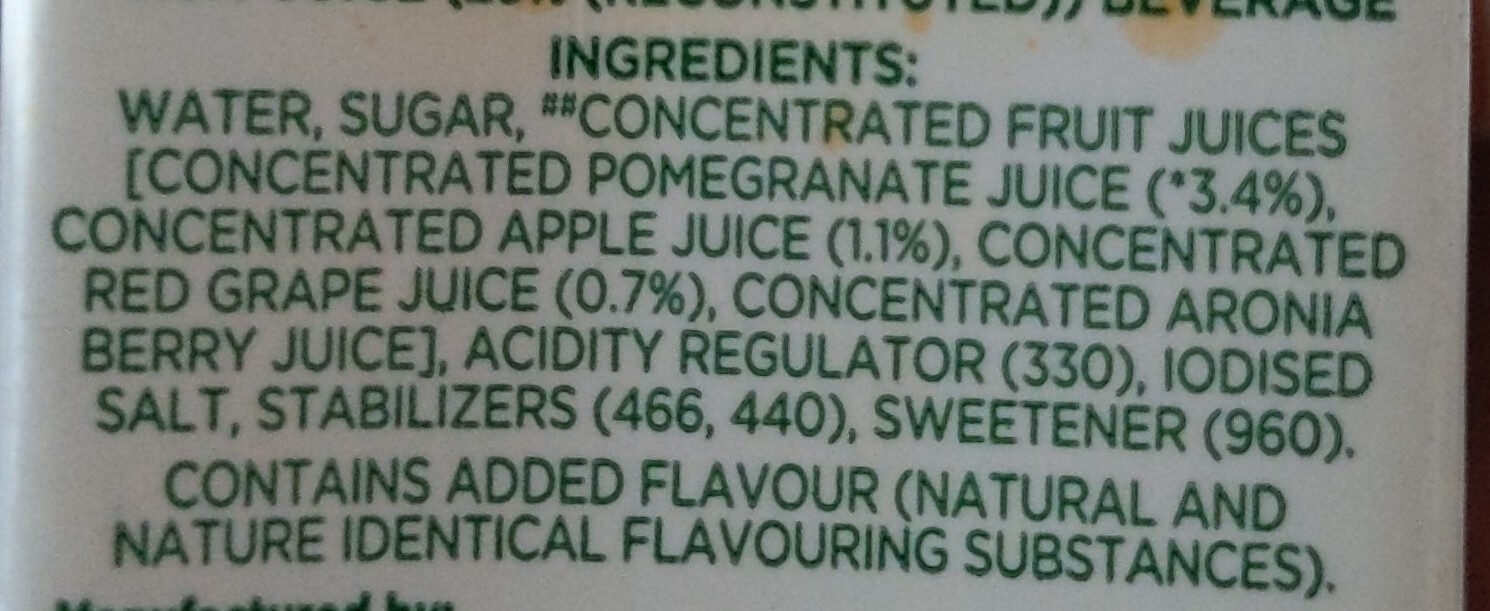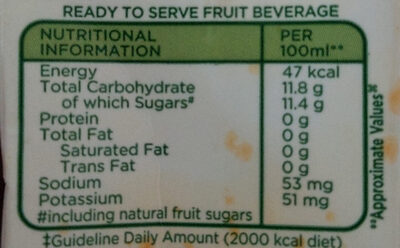Help us make food transparency the norm!
As a non-profit organization, we depend on your donations to continue informing consumers around the world about what they eat.
The food revolution starts with you!
Pomegranate Delight - Tropicana - 200 ml
Pomegranate Delight - Tropicana - 200 ml
This product page is not complete. You can help to complete it by editing it and adding more data from the photos we have, or by taking more photos using the app for Android or iPhone/iPad. Thank you!
×
Barcode: 8902080011612 (EAN / EAN-13)
Quantity: 200 ml
Packaging: Multilayer-composite, Tetra Pak
Brands: Tropicana
Categories: Plant-based foods and beverages, Beverages, Plant-based beverages, Fruit-based beverages, Juices and nectars, Fruit juices
Countries where sold: India
Matching with your preferences
Health
Ingredients
-
18 ingredients
water, sugar, ';concentrated fruit juices [concentrated pomegranate juice ('3.4%), concentrated apple juice (1.1%), concentrated red grape juice (0.7%), concentrated aronia berry juice], acidity regulator (330), iodised salt, stabilizers (466, 440), sweetener (960). contains added flavour (natural and nature identical flavouring substances).
Food processing
-
Ultra processed foods
Elements that indicate the product is in the 4 - Ultra processed food and drink products group:
- Additive: E440 - Pectins
- Additive: E466 - Sodium carboxy methyl cellulose
- Additive: E960 - Steviol glycosides
- Ingredient: Flavouring
- Ingredient: Sweetener
Food products are classified into 4 groups according to their degree of processing:
- Unprocessed or minimally processed foods
- Processed culinary ingredients
- Processed foods
- Ultra processed foods
The determination of the group is based on the category of the product and on the ingredients it contains.
Additives
-
E330 - Citric acid
Citric acid is a natural organic acid found in citrus fruits such as lemons, oranges, and limes.
It is widely used in the food industry as a flavor enhancer, acidulant, and preservative due to its tart and refreshing taste.
Citric acid is safe for consumption when used in moderation and is considered a generally recognized as safe (GRAS) food additive by regulatory agencies worldwide.
-
E440 - Pectins
Pectins (E440) are natural carbohydrates, predominantly found in fruits, that act as gelling agents in the food industry, creating the desirable jelly-like texture in jams, jellies, and marmalades.
Pectins stabilize and thicken various food products, such as desserts, confectioneries, and beverages, ensuring a uniform consistency and quality.
Recognized as safe by various health authorities, pectins have been widely used without notable adverse effects when consumed in typical dietary amounts.
-
E466 - Sodium carboxy methyl cellulose
Carboxymethyl cellulose: Carboxymethyl cellulose -CMC- or cellulose gum or tylose powder is a cellulose derivative with carboxymethyl groups --CH2-COOH- bound to some of the hydroxyl groups of the glucopyranose monomers that make up the cellulose backbone. It is often used as its sodium salt, sodium carboxymethyl cellulose.Source: Wikipedia
-
E960 - Steviol glycosides
Steviol glycoside: Steviol glycosides are the chemical compounds responsible for the sweet taste of the leaves of the South American plant Stevia rebaudiana -Asteraceae- and the main ingredients -or precursors- of many sweeteners marketed under the generic name stevia and several trade names. They also occur in the related species Stevia phlebophylla -but in no other species of Stevia- and in the plant Rubus chingii -Rosaceae-.Steviol glycosides from Stevia rebaudiana have been reported to be between 30 and 320 times sweeter than sucrose, although there is some disagreement in the technical literature about these numbers. They are heat-stable, pH-stable, and do not ferment. Additionally, they do not induce a glycemic response when ingested, because humans can not metabolize stevia. This makes them attractive as natural sugar substitutes for diabetics and other people on carbohydrate-controlled diets. Steviol glycosides stimulate the insulin secretion through potentiation of the β-cell, preventing high blood glucose after a meal. The acceptable daily intake -ADI- for steviol glycosides, expressed as steviol equivalents, has been established to be 4 mg/kg body weight/day, and is based on no observed effects of a 100 fold higher dose in a rat study.Source: Wikipedia
Ingredients analysis
-
Palm oil content unknown
Unrecognized ingredients: Concentrated-aronia-berry-juice, 330, 466, 440, 960Some ingredients could not be recognized.
We need your help!
You can help us recognize more ingredients and better analyze the list of ingredients for this product and others:
- Edit this product page to correct spelling mistakes in the ingredients list, and/or to remove ingredients in other languages and sentences that are not related to the ingredients.
- Add new entries, synonyms or translations to our multilingual lists of ingredients, ingredient processing methods, and labels.
If you would like to help, join the #ingredients channel on our Slack discussion space and/or learn about ingredients analysis on our wiki. Thank you!
-
Vegan status unknown
Unrecognized ingredients: Concentrated-aronia-berry-juice, 330, 466, 440, 960Some ingredients could not be recognized.
We need your help!
You can help us recognize more ingredients and better analyze the list of ingredients for this product and others:
- Edit this product page to correct spelling mistakes in the ingredients list, and/or to remove ingredients in other languages and sentences that are not related to the ingredients.
- Add new entries, synonyms or translations to our multilingual lists of ingredients, ingredient processing methods, and labels.
If you would like to help, join the #ingredients channel on our Slack discussion space and/or learn about ingredients analysis on our wiki. Thank you!
-
Vegetarian status unknown
Unrecognized ingredients: Concentrated-aronia-berry-juice, 330, 466, 440, 960Some ingredients could not be recognized.
We need your help!
You can help us recognize more ingredients and better analyze the list of ingredients for this product and others:
- Edit this product page to correct spelling mistakes in the ingredients list, and/or to remove ingredients in other languages and sentences that are not related to the ingredients.
- Add new entries, synonyms or translations to our multilingual lists of ingredients, ingredient processing methods, and labels.
If you would like to help, join the #ingredients channel on our Slack discussion space and/or learn about ingredients analysis on our wiki. Thank you!
-
Details of the analysis of the ingredients
We need your help!
Some ingredients could not be recognized.
We need your help!
You can help us recognize more ingredients and better analyze the list of ingredients for this product and others:
- Edit this product page to correct spelling mistakes in the ingredients list, and/or to remove ingredients in other languages and sentences that are not related to the ingredients.
- Add new entries, synonyms or translations to our multilingual lists of ingredients, ingredient processing methods, and labels.
If you would like to help, join the #ingredients channel on our Slack discussion space and/or learn about ingredients analysis on our wiki. Thank you!
en: water, sugar, fruit juices (pomegranate juice (), concentrated apple juice, red grape juice, concentrated aronia berry juice), acidity regulator (330), iodised salt, stabilizers (466, 440), sweetener (960), contains added flavour (natural flavouring, nature identical flavouring substances)- water -> en:water - vegan: yes - vegetarian: yes - ciqual_food_code: 18066
- sugar -> en:sugar - vegan: yes - vegetarian: yes - ciqual_proxy_food_code: 31016
- fruit juices -> en:fruit-juice - vegan: yes - vegetarian: yes
- pomegranate juice -> en:pomegranate-juice - vegan: yes - vegetarian: yes
- concentrated apple juice -> en:concentrated-apple-juice - vegan: yes - vegetarian: yes - ciqual_food_code: 2074
- red grape juice -> en:red-grape-juice - vegan: yes - vegetarian: yes - ciqual_food_code: 13112
- concentrated aronia berry juice -> en:concentrated-aronia-berry-juice
- pomegranate juice -> en:pomegranate-juice - vegan: yes - vegetarian: yes
- acidity regulator -> en:acidity-regulator
- 330 -> en:330
- iodised salt -> en:iodised-salt - vegan: yes - vegetarian: yes - ciqual_food_code: 11058
- stabilizers -> en:stabiliser
- 466 -> en:466
- 440 -> en:440
- sweetener -> en:sweetener
- 960 -> en:960
- contains added flavour -> en:flavouring - vegan: maybe - vegetarian: maybe
- natural flavouring -> en:natural-flavouring - vegan: maybe - vegetarian: maybe
- nature identical flavouring substances -> en:nature-identical-flavouring - vegan: maybe - vegetarian: maybe
Nutrition
-
Missing data to compute the Nutri-Score
Missing nutrition facts
⚠ ️The nutrition facts of the product must be specified in order to compute the Nutri-Score.Could you add the information needed to compute the Nutri-Score? Add nutrition facts
-
Nutrient levels
-
Fat in low quantity (0%)
What you need to know- A high consumption of fat, especially saturated fats, can raise cholesterol, which increases the risk of heart diseases.
Recommendation: Limit the consumption of fat and saturated fat- Choose products with lower fat and saturated fat content.
-
Saturated fat in low quantity (0%)
What you need to know- A high consumption of fat, especially saturated fats, can raise cholesterol, which increases the risk of heart diseases.
Recommendation: Limit the consumption of fat and saturated fat- Choose products with lower fat and saturated fat content.
-
Sugars in high quantity (11.4%)
What you need to know- A high consumption of sugar can cause weight gain and tooth decay. It also augments the risk of type 2 diabetes and cardio-vascular diseases.
Recommendation: Limit the consumption of sugar and sugary drinks- Sugary drinks (such as sodas, fruit beverages, and fruit juices and nectars) should be limited as much as possible (no more than 1 glass a day).
- Choose products with lower sugar content and reduce the consumption of products with added sugars.
-
Salt in low quantity (0.135%)
What you need to know- A high consumption of salt (or sodium) can cause raised blood pressure, which can increase the risk of heart disease and stroke.
- Many people who have high blood pressure do not know it, as there are often no symptoms.
- Most people consume too much salt (on average 9 to 12 grams per day), around twice the recommended maximum level of intake.
Recommendation: Limit the consumption of salt and salted food- Reduce the quantity of salt used when cooking, and don't salt again at the table.
- Limit the consumption of salty snacks and choose products with lower salt content.
-
-
Nutrition facts
Nutrition facts As sold
for 100 g / 100 mlAs sold
per serving (100ml)Compared to: Fruit juices Energy 197 kj
(47 kcal)197 kj
(47 kcal)-8% Fat 0 g 0 g Saturated fat 0 g 0 g Polyunsaturated fat 0.051 g 0.051 g Carbohydrates 11.8 g 11.8 g -8% Sugars 11.4 g 11.4 g -4% Fiber ? ? Proteins ? ? Salt 0.135 g 0.135 g +207% Fruits‚ vegetables‚ nuts and rapeseed‚ walnut and olive oils (estimate from ingredients list analysis) 12.5 % 12.5 %
Environment
-
Eco-Score E - Very high environmental impact
⚠ ️The full impact of transportation to your country is currently unknown.The Eco-Score is an experimental score that summarizes the environmental impacts of food products.→ The Eco-Score was initially developped for France and it is being extended to other European countries. The Eco-Score formula is subject to change as it is regularly improved to make it more precise and better suited to each country.Life cycle analysis
-
Average impact of products of the same category: D (Score: 24/100)
Category: Mixed fruits juice, pure juice
Category: Mixed fruits juice, pure juice
- PEF environmental score: 0.32 (the lower the score, the lower the impact)
- including impact on climate change: 0.91 kg CO2 eq/kg of product
Stage Impact Agriculture
80.8 %Processing
1.8 %Packaging
4.5 %Transportation
9.3 %Distribution
2.8 %Consumption
0.8 %
Bonuses and maluses
-
Missing origins of ingredients information
Malus:
⚠ ️ The origins of the ingredients of this product are not indicated.
If they are indicated on the packaging, you can modify the product sheet and add them.
If you are the manufacturer of this product, you can send us the information with our free platform for producers.
-
Packaging with a low impact
Malus: -4
Shape Material Recycling Impact Brick Tetra Pak Medium
Eco-Score for this product
-
Impact for this product: E (Score: 15/100)
Product: Pomegranate Delight - Tropicana - 200 ml
Life cycle analysis score: 24
Sum of bonuses and maluses: -4
Final score: 15/100
-
Carbon footprint
-
Equal to driving 0.5 km in a petrol car
91 g CO² per 100g of product
The carbon emission figure comes from ADEME's Agribalyse database, for the category: Mixed fruits juice, pure juice (Source: ADEME Agribalyse Database)
Stage Impact Agriculture
34.1 %Processing
9.7 %Packaging
16.3 %Transportation
35.3 %Distribution
3.9 %Consumption
0.7 %
Packaging
-
Packaging with a low impact
-
Packaging parts
Brick (Tetra Pak)
-
Packaging materials
Material % Packaging weight Packaging weight per 100 g of product
-
Transportation
-
Origins of ingredients
Missing origins of ingredients information
⚠ ️ The origins of the ingredients of this product are not indicated.
If they are indicated on the packaging, you can modify the product sheet and add them.
If you are the manufacturer of this product, you can send us the information with our free platform for producers.Add the origins of ingredients for this product Add the origins of ingredients for this product
Report a problem
-
Incomplete or incorrect information?
Category, labels, ingredients, allergens, nutritional information, photos etc.
If the information does not match the information on the packaging, please complete or correct it. Open Food Facts is a collaborative database, and every contribution is useful for all.
Data sources
Product added on by openfoodfacts-contributors
Last edit of product page on by ashaman.
Product page also edited by aleene, ecoscore-impact-estimator, off.5688ffd6853b35d3142bbed4a5d76d1, packbot, zuron7.
